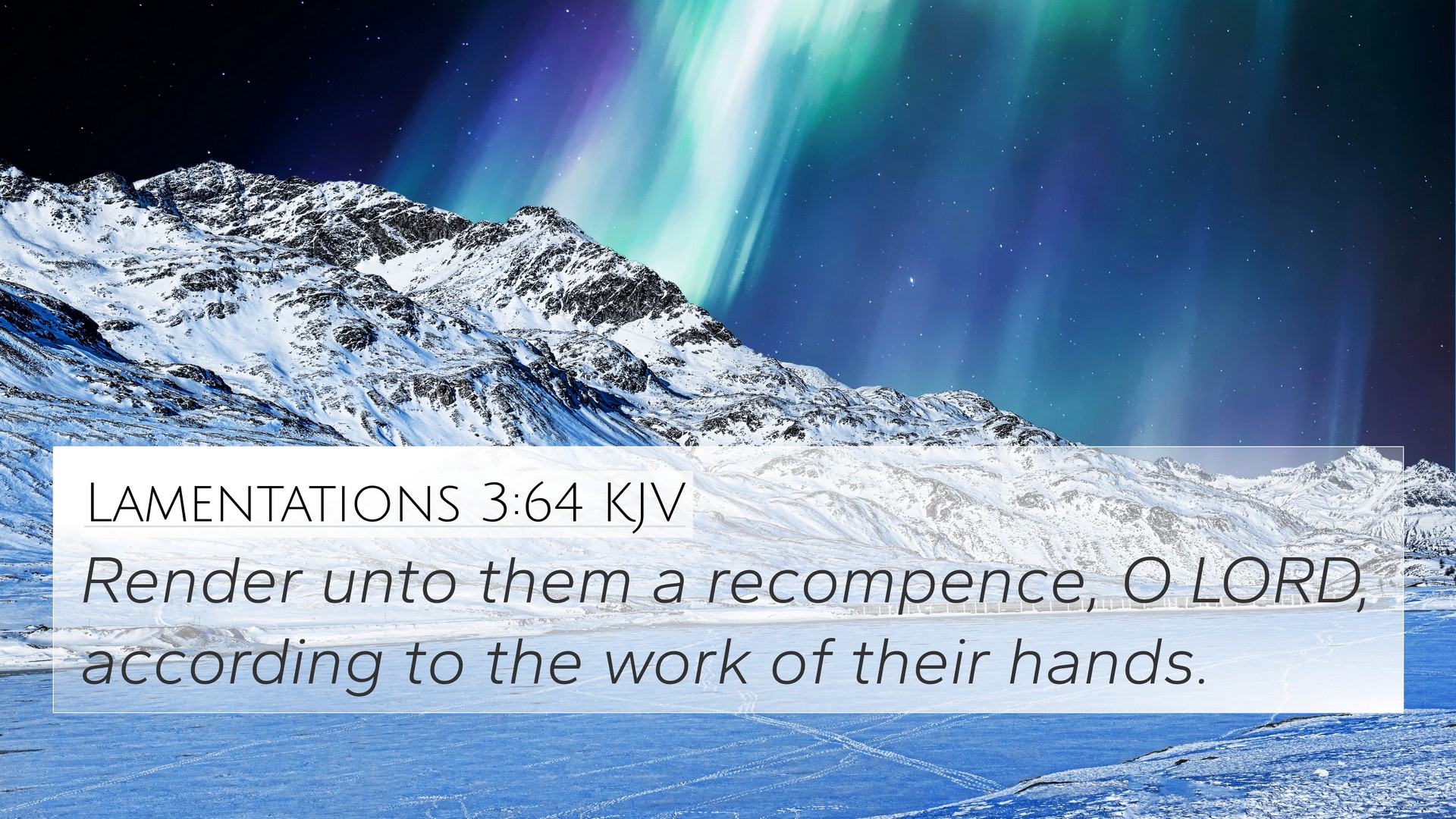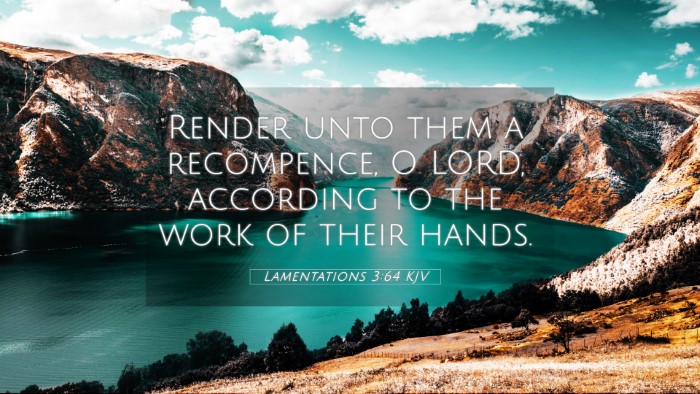Lamentations 3:64 - Interpretation and Meaning
Verse Context: Lamentations 3:64 states,
"Render unto them a recompense, O Lord, according to the work of their hands."
This verse appears in a context where the prophet Jeremiah is sorrowfully reflecting on the suffering of his people and calling upon God for justice against their oppressors.
Combined Insights from Public Domain Commentaries
Matthew Henry's Commentary
Matthew Henry highlights the profound sorrow and grief of Jeremiah as he laments the destruction of Jerusalem and the suffering of its inhabitants. He indicates that in this verse, the prophet appeals to God’s justice, asking for recompense for the evil done to his people. The call for recompense signifies a desire for divine intervention and acknowledgment of wrongdoing.
Albert Barnes' Notes
Albert Barnes emphasizes the importance of divine justice. He interprets Jeremiah's request as an earnest plea for God to take action against the evildoers. Barnes notes that this verse reflects a larger theme of seeking justice and the certainty that God will ultimately repay individuals according to their deeds, aligning with the principle found in Galatians 6:7, which states that a man reaps what he sows.
Adam Clarke's Commentary
Adam Clarke discusses the nature of divine order and justice, pointing out that Jeremiah's anguish is not just personal but representative of a nation suffering from the consequences of sin and rebellion against God. He mentions how the verse blends the notions of prayer and prophecy—an appeal for God's righteous judgment against those who perpetrated injustice against Judah.
Key Themes and Components
- Divine Justice: The persistent theme of seeking retribution reflects the core belief that God will ensure justice prevails.
- Human Suffering: Highlights the plight and grievances of the people of Israel, serving as a reminder of the consequences of national sin.
- Prayer and Advocacy: Demonstrates the role of the prophet as an intercessor, pleading for restoration and vindication.
- Recompense: The demand for payment reflects a desire for balance and accountability, consistent throughout Scripture.
Cross References
- Galatians 6:7: "Do not be deceived: God is not mocked, for whatever one sows, that will he also reap."
- Psalm 28:4: "Give them according to their work and according to the evil of their deeds."
- Revelation 20:12: "And the dead were judged by what was written in the books, according to what they had done."
- Isaiah 3:10-11: "Say to the righteous that it shall be well with them, for they shall eat the fruit of their deeds. Woe to the wicked! It shall be ill with them, for what his hands have dealt out shall be done to him."
- Jeremiah 51:24: "And I will repay Babylon and all the inhabitants of Chaldea before your very eyes for all the evil that they have done in Zion."
- Ezekiel 18:30: "Therefore I will judge you, O house of Israel, every one according to his ways, declares the Lord God. Repent and turn from all your offenses..."
- Proverbs 11:21: "Be assured, an evil person will not go unpunished, but the offspring of the righteous will be delivered."
Thematic Connections and Insights
This verse connects significantly with numerous themes across scripture. Here are some insights:
- **Justice and Retribution:** Lamentations expresses a profound theme of seeking justice, which resonates with numerous New Testament teachings about God's judgment.
- **Human Suffering and Divine Intervention:** The interplay between suffering and the need for divine justice is a consistent thread linking the Old Testament lamentations and New Testament hope.
- **Repentance:** The desire for recompense invites readers to consider the theme of repentance and the recognition of sin as foundational for restoration, found throughout the prophetic literature.
- **God's Faithfulness:** Jeremiah’s call for divine recompense reveals the belief that God is faithful to his promises of justice throughout biblical narratives.
Tools for Cross-Referencing Bible Verses
Utilizing cross-references can greatly enhance one’s understanding of Scripture. Here are resources and methods to assist in this exploration:
- Bible Concordances: These are essential tools that provide a systematic way to locate all the occurrences of words or themes across the Bible.
- Cross-Reference Guides: These resources help to identify connections between biblical texts, enhancing thematic studies.
- Cross-Reference Bibles: Many Bibles come with built-in cross-reference systems that point readers to related verses.
- Personal Study Methods: Engaging in a comparative study of different scriptures can deepen understanding, particularly in thematic explorations.
Conclusion
Lamentations 3:64 serves as a poignant reminder of the depths of human despair and the necessary call for divine justice. By utilizing tools and themes related to cross-references, readers can significantly enhance their understanding of this verse and its implications within the broader narrative of Scripture.








